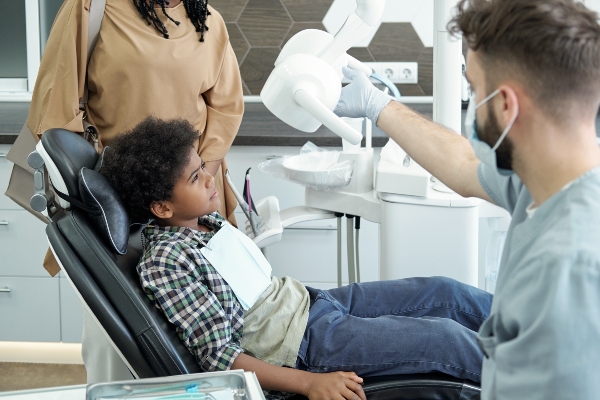Keep Your Baby’s Fluoride Intake Within Moderate Limits

Fluoride is important when it comes to practicing good oral hygiene because it is great for preventing cavities and tooth decay. Despite its benefits, dentists recommend lower levels of fluoride intake for young kids because too much of it can be harmful.
What is fluoride?
Fluoride is a natural chemical derived from fluorine, an element found in the earth’s crust. Due to its ability to strengthen enamel and prevent tooth decay, tiny amounts of fluoride are added to the public drinking water in most communities. The American Dental Association also recommends using toothpaste that contains fluoride to brush your teeth.
Why should you limit your baby’s intake of fluoride?
According to the American Dental Association, babies need less fluoride than adults and older kids. Even though decades of research has shown that fluoride does not pose any serious health risks, dentists recommend limiting the fluoride intake for infants because too much of it can be harmful to their oral health.
Enamel fluorosis is a condition that causes discoloration or the streaking of permanent teeth, which will likely require cosmetic dentistry to fix. The condition does not affect adults, but it can affect your child if they ingest too much fluoride during early development.
What are the symptoms of fluoride poisoning?
The consumption of too much fluoride by a baby can lead to diarrhea, upset stomach, nausea and increased salivation. If your baby has any of these symptoms, you should take them to get immediate medical attention.
How do you know how much fluoride is safe for your baby?
Even though fluoride is commonly found in tap water and oral health products, it can also be found in beverages like juices and in food processed with fluoridated water. Since there are no laws requiring fluoride to be listed as an ingredient in food and other beverages, you have to do your own research to find out if a product contains fluoride and how much fluoride it has in it.
How can you limit your baby’s fluoride intake?
Since it will be difficult to find out how much, if any, fluoride is in all the food and beverages your baby consumes, you can limit the baby’s fluoride intake by making a few changes to what the baby eats and drinks.
When you brush your baby’s teeth, you should use a very small amount of toothpaste, which will reduce the amount of fluoride the baby consumes if they swallow the toothpaste.
If your tap water contains fluoride, you can either breastfeed the child or feed the baby powdered formula and substitute the fluoridated water with de-ionized, distilled or purified water, all of which do not contain fluoride.
Conclusion
Fluoride is great for your teeth because it helps prevent tooth decay and strengthens your enamel. However, you should not let your baby consume too much of it. If you are not sure about how much fluoride you should give your baby, ask your dentist for more information about how you can limit your baby’s intake.
Request an appointment here: https://fortleefamilydental.com or call Fort Lee Family Dental at (201) 620-9772 for an appointment in our Fort Lee office.
Check out what others are saying about our services on Yelp: Read our Yelp reviews.
Recent Posts
Practicing good oral hygiene basics is the best line of defense against cavities, abscesses and other problems that can plague a person’s mouth. A visit to the dentist can show someone where changes need to be made and help direct improvements in cleaning habits. The following information can more fully explain what needs to happen…
There are oral hygiene practices at home that everyone can implement during the coronavirus outbreak to reduce the risk of developing an oral health concern. It is helpful to know the right oral hygiene steps to take to ensure good oral health until the next dentist visit can be scheduled. By brushing regularly, using fluoride-based mouthwash,…
One of the greatest myths about aging and dental health is that you will lose your teeth during aging. That is not true. Aging is a natural and irreversible process that depends on many factors such as heredity, environment and your way of life. Your teeth should last a lifetime and your life is in…
Most people are unaware of the initial signs of a cavity since these indicators often overlap with other oral health maladies. Cavities are one of the nation's leading health problems. The rise in cavity prevalence is partially due to the fact that food and beverage manufacturers are loading up all sorts of different products with…


